- Home
- Charlie Higson
Hurricane Gold Page 10
Hurricane Gold Read online
Page 10
In the centre of the square on a raised terrace stood a short stone column with two iron rings set halfway up its sides. It looked slightly out of place here, in these elegant, romantic surroundings. El Huracán had no doubt that every so often a man would stop and notice it and wonder what it was, and why El Huracán hadn’t replaced it with something more attractive – a statue or a fountain, maybe.
But El Huracán would never get rid of it. It was a reminder of dark times, a reminder of what this place had once been.
The column was a whipping post. In days gone by prisoners had been shackled to it and flogged with a bullwhip or a cane. Sometimes they would be shot and left to rot there in the sun as a warning to others. The flagstones around the base of the column were worn down from being scrubbed. So much blood had been washed down into the drains around it.
So much blood.
The imposing house where El Huracán now lived, at the head of the square, had once been the administrative block. The prison governor had lived and worked here. The buildings around the square that were now shops and restaurants had once been guardrooms and punishment cells.
Lagrimas Negras lay between Mexico’s Yucatán peninsula and the Caymans, part of the chain of Caribbean islands that sweep down from Cuba, through Jamaica, Haiti, Puerto Rico and scores of smaller islands, to Trinidad off the coast of Venezuela.
The first settlers here had been Mayans. Nobody knew for sure when they first arrived, but some time in the tenth century they had built several monumental structures, including temples, tombs, the two pyramids, a ball court and an observatory. Not much of these original buildings remained. Later settlers, with no regard for history, had dismantled them to use the stone for new structures, and in some cases had simply built on top of the old Mayan ruins.
In the seventeenth century Lagrimas Negras had become an important staging post for the slave trade, sitting as it did between the other Caribbean islands, Central America and the southern United States. A slave market was established which was later turned into a penal colony for captured runaways, troublemakers and slaves who refused to do as they were told on the plantations.
For the Mayans the island had been sacred to the god Hurakan, who had drowned the world in a great flood after the first humans had angered the gods. He had then made the world again, calling it up out of the floodwaters. The Mayan name for the island had been forgotten and it had come to be known as Lagrimas Negras – Black Tears.
Lagrimas Negras became feared throughout the slave communities. If there was one thing worse than being a slave it was being sent here.
In 1830, though, the prisoners rose up, overthrew their jailers and declared Lagrimas Negras an independent free state. There were already many Maroon settlements along the mainland coast, villages and even towns that had been created by runaway slaves. Lagrimas Negras was just one more.
They might have been left in peace if President Santa Anna hadn’t declared war on the United States in 1846. The Americans needed a naval base in the area, and, realising the strategic importance of the island, they sent in gunships. There was a brief and bloody battle. The ex-prisoners, poorly armed and badly outnumbered, didn’t stand a chance.
Only one man escaped – El Huracán’s father, Gaspar.
He stole a boat and sailed south-west to British Honduras. He moved quickly inland, deep into the heart of the rainforest, eventually settling with a family of Lacandon Indians. By the time he died at the age of ninety-seven he had ten children and thirty-eight grandchildren.
His youngest child was named Hurakan, after the God who had protected Gaspar. He grew up rarely seeing sunlight and by the time he was twelve he had learnt how to survive alone in the unforgiving jungle environment. He was restless, though, and knew from his father’s tales that there was a world outside the forest. He wanted to see the ocean and the big cites. He wanted to see fields and horses and sheep, and he wanted to see an open sky.
He left home.
That was fifty-five years ago.
Since then he had seen a lot more than he could ever have imagined.
He had worked as a guide for loggers in the jungle. He had been a sailor. He had worked on a sugar plantation in Cuba. He had fought for the Cubans against the Americans in the Spanish–American War. He had returned to Mexico and fought in the revolution, riding with Pancho Villa’s elite cavalry, Los Dorados, the Golden Ones. There he acquired his new name, his Spanish name, El Huracán, the Hurricane. He would come down out of the hills with his horsemen like a sudden fierce storm and destroy everything in his way.
Along the way he had been a train robber, an encyclopedia salesman, a banker, a gunrunner, a bootlegger, a farmer and a shopkeeper. He had drilled for oil and dug for gold. For a while, he had been a politician, but had decided he preferred honest crooks to the ones he found in government. He knew the most important people in Mexico, from the aristocrats and ruling classes to the peasant leaders, from the crime bosses to officers in the police and army, and he had become a very wealthy man.
He had been married four times and outlived each of his wives. His first wife had died in childbirth, his second had died of smallpox, the third was shot by one of Carranza’s soldiers and the fourth had died in a riding accident.
In 1918, at the age of fifty-two, he had finally visited the island of Lagrimas Negras to see where his father had come from. It had been abandoned. The fortified harbour was silted up. The buildings were empty and quiet, home to bats and snakes and scorpions.
He had had a vision of what he could do with this lonely place.
The Americans still claimed ownership of the island, but they had left long ago to build a larger and more useful naval base in Cuba. They were pleased to get Lagrimas Negras off their hands and sold it to El Huracán for 35,000 dollars.
He brought a loyal gang of followers out here; Mexican Indians, mostly, from the Chiapas, but also a few Maroons and some ex-revolutionaries who had fought alongside him.
He rebuilt the houses, he dredged the harbour. He installed electricity, sewers and running water. He made elegant streets and built new villas. He converted an ammunition dump into a bank. By the time he had finished Lagrimas Negras had been turned into a luxury resort, but the guests were not going to be ordinary holidaymakers.
He started to put the word around: if you were on the run, if you were in trouble, if you needed somewhere to hide, you could come to Lagrimas Negras, and you could stay there, free from harm – at a price.
Gradually criminals arrived. If they had enough money they were allowed to stay. If not, El Huracán would capture them and send them back to the Mexican police, or to the Americans, or Brazilians, or wherever they had come from.
His plan worked. His island was full of desperadoes. His bank was full of money.
He was King of the World.
11
An Ancient Japanese Art
‘Go on, Corona, stab him,’ yelled Strabo, his voice rasping and husky, as if he needed to clear his throat. ‘Stick him in his fat Jap gut.’
‘Whatzat?’ said his skinny friend, who was half-deaf. In fact he said ‘Whatzat?’ so often that the others all called him Whatzat.
Whether he knew it or not, James wasn’t sure.
‘I told the kid to stab him good,’ said Strabo, shouting right into Whatzat’s ear.
James was holding a hunting knife. A big, mean brute with an 8-inch blade, serrated along one edge. Sakata, the Japanese member of the gang, was unarmed. He was standing there in the firelight, at ease, a faint smile tickling his lips. He was a huge man, overweight and bloated, but at the same time he was very light on his small feet. He moved with a graceful daintiness, like a dancer. He said very little and kept himself apart from the others.
James didn’t know what to do. He was still pretending to be a tough Mexican street kid. A pickpocket. Handy with a knife. The men were only playing, but they played hard. James knew that to save face he would have to show that he was one of the boys
. He had to at least look like he was trying to stab the big Japanese.
Sakata’s absolute calm was impressive. For all he knew, James might try to kill him.
They were in a wide clearing in a forest. It was late at night and a fire was blazing. The two American men were drunk. Mrs Glass was sitting off to one side, ignoring them. Quietly smoking a cigarette and staring into the darkness.
Garcia was sitting with Precious and JJ, who both looked pale and dirty and tired. JJ was huddled in a blanket, shivering and sweating. Garcia had done his best, but the wound in the little boy’s leg was infected.
Mrs Glass and the others didn’t care, and James had to pretend not to be bothered either. But JJ was clearly sick. Even if they could get him to a hospital in the next few days, James was worried that his chances of pulling through were not looking good. He was young and weak; his small body could only take so much. If the infection spread there was no medicine in the world that could cure him. He might lose his leg. He might lose his life.
The last few days had been frustrating for Mrs Glass and her gang, as they had tried to get away from the storm-ravaged stretch of land along the coast. Many areas were still under several feet of water and the river had grown too wide and too fast to cross. They had had to travel further and further inland on roads that were little more than dirt tracks.
James had sworn to help JJ and Precious, and he wished he had more of a plan for getting away from the gang when the time came. For now it seemed sensible to stay with them until they got nearer to a large town where they could get help. At least they had food and transport. The truck became slower each day, however. Garcia was using all his ingenuity to keep it going, but there wasn’t much life left in it. There was hardly a part of the engine that he hadn’t repaired.
He drove, sitting up front with Mrs Glass and Sakata. James and the children sat out on the back with the other two men, where they felt every bump and dip in the road. Strabo needled Whatzat constantly about the truck, blaming him for not boosting something more reliable. Whatzat grumbled that it wasn’t his fault; the two of them had chosen the truck together.
James had plenty of time to study his travelling companions, and the more he saw of them the less he liked them. Strabo, as well as being short and wide and meaty, was also the hairiest man James had ever seen. His neck was hairy. The backs of his hands were hairy. Hair curled out of the top of his shirt and from between the buttons. He would shave first thing in the morning, but five minutes later his chin would be shaded blue and covered in bristles. You could almost see his beard growing as the day went on.
In contrast, Whatzat was bony and raw-looking. With his fuzz of close-cropped hair, he looked like a soldier or a farmer. He seemed uncomfortable in his own skin. The heat brought him out in a rash and he was forever scratching himself. He was fidgety and irritable and on a very short fuse. His inability to hear properly made him mad at the world and he would fly off the handle and yell at the children with little warning.
James didn’t want to get on the wrong side of either of these two. He humoured them. He laughed at their coarse jokes. He listened to their stories, which, more often than not, were about starting a fight or beating someone to a bloody pulp. In the evenings he drank with them and played cards while they argued and complained to each other. All the time he was slyly probing them, asking them questions. One of the things he found out was that they had lost Manny in the storm, and, in their haste to get away with the safe, they hadn’t looked for him.
He hardly touched the bottles of weak Mexican beer they gave him, hoisted from a ruined bar in Tres Hermanas. He drank a little but poured most of it away when they weren’t looking. He needed to keep a clear head, because every moment of every day he spent looking for ways to escape.
Tonight had been no different. Strabo and Whatzat’s raucous laughter filled the night. Growing bored with arm-wrestling and ever-more inventive name-calling, they had egged James on to start a fight with Sakata. James had held back, but in the end Strabo had handed him his knife and nodded towards the Japanese man.
‘This should even the odds,’ he had rasped as Whatzat had dragged James up and shoved him towards Sakata.
Sakata had sprang lightly to his feet and stood waiting for him.
And now here they were, facing each other in the firelight.
‘Go on, kid, let’s see the colour of his blood,’ Whatzat screeched. ‘He’s just a no-good, lousy Jap.’
James locked eyes with Sakata, trying to read him. It was impossible. The Japanese man was giving nothing away. He stood as still and impassive as a rock.
‘I kill him,’ said James, who no longer had to think before using his Mexican accent. The men had fully accepted him as a local.
‘Whatzat?’ said Whatzat. ‘What’d he say?’
‘I said I kill him,’ James shouted.
‘You won’t kill him, kid,’ said Strabo and he burped. ‘You won’t get near him.’
Sakata smiled fully now. ‘Don’t worry,’ he said quietly. ‘I am ready for you. Come as hard and as fast as you like.’
‘OK.’ James laughed and shook his head, then, with a yell, he ran at Sakata, holding the knife in front of him. He wouldn’t try to kill Sakata, but if he could draw blood the men might be satisfied.
He wasn’t entirely sure what happened next. Sakata barely seemed to move, but somehow he grabbed hold of James by the arm and the shirt front, dropped neatly on to his back, raised a leg and launched James into the air. One moment James was running forward, and the next he was flying face first into the fire. He landed on the edge, scattering sticks and hot embers, and quickly rolled clear before he was burnt.
Strabo and Whatzat were helpless with laughter. James coughed and dusted himself down. His clothes were singed and spotted with blackened holes. His face was covered with soot and ash, but he wasn’t hurt. He turned to Sakata, who was back on his feet and looking as calm and composed as before.
‘You want to try again?’ Sakata said.
James picked up the knife, weighed it in his hand, grinned and nodded. He would be more careful this time. He moved forward cautiously, on the balls of his feet, swaying from side to side, swinging the knife through the air. Sakata stayed still, in a low crouch, his arms slightly extended in front of him, his hands open.
His eyes never left James’s.
James lunged, and again Sakata was ready for him. Quick as a cat, he grabbed James’s wrist and turned him. There was an excruciating pain in his elbow. He dropped the knife and the next thing he knew he was flat on his back with Sakata standing over him, still holding his arm in a lock.
This time Sakata helped him up.
‘Had enough?’
James shook his head. Sakata handed him the knife.
‘Don’t hold back,’ he said.
‘I wasn’t,’ said James.
Sakata smiled and James spun quickly, hoping to get him before he was ready. He lashed at him with the edge of the blade in a powerful sweep, but Sakata simply skipped out of the way. James tried to get him on the return sweep but Sakata was too quick for him and in a flurry of confusing moves he soon had James pressed face down in the dirt, his knife arm pinned behind his back.
‘You had enough this time?’ said Sakata.
James couldn’t move, every joint from his shoulder to his fingertips was on fire, but he managed to mumble ‘yes’ and Sakata let him go.
James sat up painfully.
‘How do you do that?’ he said.
‘It is called ju-jitsu,’ said Sakata. ‘It is an ancient Japanese art of fighting. It was part of the training for all samurai warriors.’
‘Could you teach it to me?’ asked James.
‘Maybe,’ said Sakata and James noticed that there was blood trickling out of his sleeve, which was ripped. Sakata noticed it too, and raised an eyebrow.
‘Looks like you scratched me after all,’ he said approvingly. ‘Yes. I think you would make a fine samurai. You are brave a
nd you are not scared to fight. I will show you.’
James quite liked the big Japanese man. There was a dignity about him that was lacking in the other two men. But he had to keep reminding himself that Sakata was still a gangster. He had gone to the Stones’ house to rob it. In the process a man had been killed and nobody seemed the least bit bothered about it.
James had too many unanswered questions. The gang were after something, but he didn’t know what or why. Why had they come all the way down to Mexico to carry out a robbery? What was in Stone’s safe that was so valuable? Why were they holding Precious and JJ hostage? What was Mrs Glass’s story?
He needed to find answers to these questions. The more he knew about the gang the better position he would be in when it came time to act.
Sakata showed James some simple moves. James was a fast learner and Sakata was impressed.
‘You must either throw your enemy or hold him in such a way that he cannot move,’ he explained. ‘You use the joints against themselves. You must understand all the weaknesses of the human body.’
James nodded. He already knew quite a lot about the weaknesses of the human body.
‘You must be light and soft, you must bend easily, like a young bamboo, but you must lock your opponent so that he cannot use his muscles against you. That way you can defeat an enemy who is much bigger than you.’
After an hour James was exhausted, covered in bruises and soaked with sweat. Sakata was as cool and relaxed as when they had started. Finally, James limped over to Precious and Garcia.
He took a drink of water from a canteen and sat down on a log.
JJ was sleeping, his head in his sister’s lap.
‘You seem to be getting on very well with them,’ said Precious.
‘Don’t be a fool,’ said James, dropping his Mexican accent. ‘You know our only chance is if they think I’m on their side. I’m going to find a way out of this. We’re going to get away.’
‘We must wait,’ said Garcia. ‘When the time comes we will know it.’

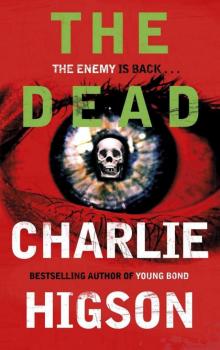 The Dead
The Dead The Sacrifice
The Sacrifice The Fallen
The Fallen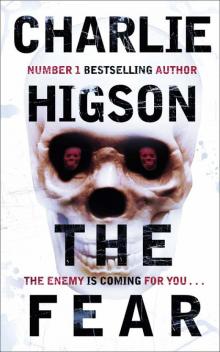 The Fear
The Fear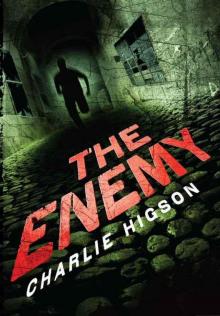 The Enemy
The Enemy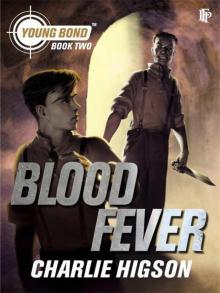 Blood Fever
Blood Fever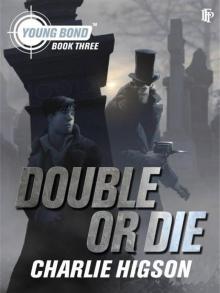 Double or Die
Double or Die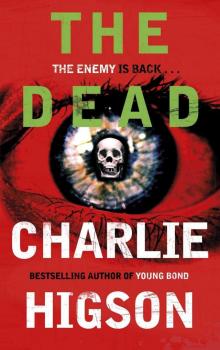 Young Bond, The Dead
Young Bond, The Dead The Hunted
The Hunted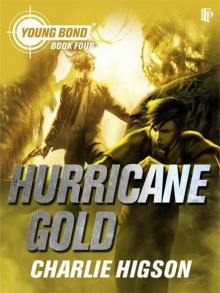 Hurricane Gold
Hurricane Gold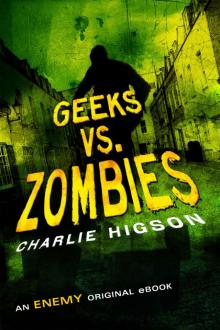 Geeks vs. Zombies
Geeks vs. Zombies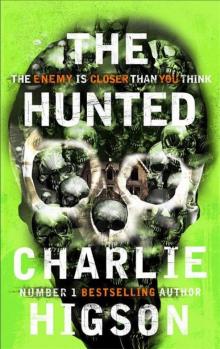 The Hunted (The Enemy Book 6) (Enemy 6)
The Hunted (The Enemy Book 6) (Enemy 6)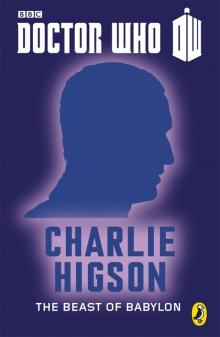 The Beast of Babylon
The Beast of Babylon